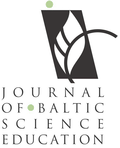PRE-SERVICE TEACHERS’ VIEWS ABOUT ECOSYSTEM-BASED FIELDWORK IN TERMS OF THE NATURE OF ENVIRONMENTAL EDUCATION, INVESTIGATIONS, SKILLS AND PROCESSES
| Title | PRE-SERVICE TEACHERS’ VIEWS ABOUT ECOSYSTEM-BASED FIELDWORK IN TERMS OF THE NATURE OF ENVIRONMENTAL EDUCATION, INVESTIGATIONS, SKILLS AND PROCESSES |
| Publication Type | Journal Article |
| Year of Publication | 2021 |
| Authors | Molefe, L, Aubin, J.-B. |
| Journal | Journal of Baltic Science Education |
| Volume | 20 |
| Issue | 4 |
| Start Page | 622-638 |
| Pagination | Continuous |
| Date Published | August/2021 |
| Type of Article | Original article |
| ISSN | 1648-3898 |
| Other Numbers | E-ISSN 2538-7138 |
| Keywords | environmental education, fieldwork, pre-service teachers, science process skills, scientific investigations, stepwise scientific process |
| Abstract | Today science teachers are expected to understand the nature of environmental education, and be competent in skills, methods, and procedures relevant to a science discipline. The purpose of this research was to explore pre-service science teachers’ views with regard to environmental education, investigation conducted during a freshwater ecosystem studied, skills developed and the associated stepwise scientific process. Data were collected through a five-item questionnaire that included the characteristics of environmental education, types of scientific investigations, science process skills and the scientific process. 94 students that registered for a Bachelor of Education degree participated in this research. The results from statistical analysis of the teachers’ responses showed the importance of lifelong learning, involvement of community in environmental education and development of critical and problem-solving skills. However, most teachers could not provide correct scientific investigation they conducted during the freshwater study. Although there were no correlations between the investigation, science process skills and the associated scientific process, influence of the stepwise scientific process recommended in the science curriculum was evident in the teachers’ linking of form a hypothesis to observation. The findings imply that teachers face potential challenges in understanding of scientific investigations and the scientific process. |
| URL | http://oaji.net/articles/2021/987-1629707518.pdf |
| DOI | 10.33225/jbse/21.20.622 |
| Refereed Designation | Refereed |
| Full Text |
